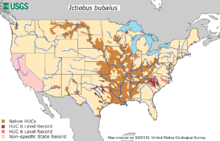Smallmouth buffalo
| Smallmouth buffalo | |
|---|---|
| Scientific classification | |
| Kingdom: | Animalia |
| Phylum: | Chordata |
| Class: | Actinopterygii |
| Order: | Cypriniformes |
| Family: | Catostomidae |
| Genus: | Ictiobus |
| Species: | I. bubalus |
| Binomial name | |
| Ictiobus bubalus (Rafinesque, 1818) | |
 | |
| The distribution of I. bubalus in the United States | |
| Synonyms | |
| |
The smallmouth buffalo (Ictiobus bubalus, from the Greek for "bull-fish" and "buffalo") is a Cypriniformes fish species found in the major tributaries and surrounding waters of the Mississippi River in the United States, as well as some other water systems where it has been introduced. It is a stocky fish like its relatives the bigmouth buffalo (I. cyprinellus) and the black buffalo (I. niger), although the smallmouth buffalo's mouth is located ventrally like other Catostomidae species, while the bigmouth buffalo's mouth is terminal and opens forward, and the smallmouth buffalo's eyes are significantly larger than those of the black buffalo. These three species are superficially similar to the common carp (Cyprinus carpio), but all lack the characteristic barbels.
Physical characteristics
The coloration of smallmouth buffalo ranges from shades of gray to brown and coppery green dorsally and pale yellow to white ventrally. Fin colors match the portion of the body where they attach and are generally darker towards the tips. They are characteristically stocky, having a hump that rises up from the operculum. Pectoral fins protrude ventrally like the anal fins, the caudal fin has even lobes, and the dorsal fin protrudes from the top of the hump to a blunt point, then shortens and runs the remaining length of the body to the base of the tail. Typical adults reach a length around 40–60 cm (16–24 in) with some specimens reaching as much as 90 cm (35 in).
Habitat
The smallmouth buffalo is a hardy fish that frequents clear, moderate to fast-moving streams, but has been occasionally known in some lakes and ponds. If prefers waters with dense aquatic vegetation and a silty bottom. It has a high tolerance for hard water and can survive in waters with pH ranges of 6.5–8.5.
Diet
The smallmouth buffalo's diet is primarily that of a detritivore, using its ventral sucker mouth to pick up vegetation and other organic matter from the bottom of its habitat, often scraping algae off of rocks. It is also quite the invertivore, consuming zooplankton, insect larvae, mollusk larvae, and small crustaceans.
Reproduction
Spawning usually takes place in spring and summer, with more specific times depending on the location of the population. Migration is negligible. Spawning often occurs in shallower sections of streams where the egg can adhere to vegetation and gravel to keep from flowing away. Each female can lay tens of thousands to hundreds of thousands of eggs at a time depending on her size, so no parental care is applied and the eggs hatch in one to two weeks. The young hide in aquatic vegetation to avoid predators. The typical lifespan of a smallmouth buffalo is 9-18 years, with males reaching sexual maturity in 4-5 years and females at around 6 years.
Commercial uses
Although considered by many to be a rough fish, smallmouth buffalo is the most common commercially sold freshwater fish in the United States. The species is highly valued by some as a human food source and the fish meal is common in animal feed. They are relatively quick and easy to raise in commercial farm ponds. Anglers seeking to hook a smallmouth buffalo have found success with doughballs and corn on hooks.
References
- ↑ NatureServe (2013). "Ictiobus bubalus". The IUCN Red List of Threatened Species. IUCN. 2013: e.T191239A18236812. doi:10.2305/IUCN.UK.2013-1.RLTS.T191239A18236812.en. Retrieved 5 January 2018.
- ↑ "Ohio Boating Accident Data Archive". Dnr.state.oh.us. Retrieved 2017-02-26.
- ↑ "Smallmouth Buffalo (Ictiobus bubalus)". Tpwd.state.tx.us. Retrieved 2017-02-26.
- ↑ "Smallmouth Buffalo (Ictiobus bubalus) - FactSheet". Nas.er.usgs.gov. Retrieved 2017-02-26.
External links


